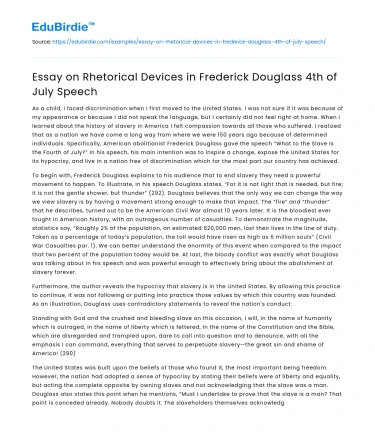As a child, I faced discrimination when I first moved to the United States. I was not sure if it was because of my appearance or because I did not speak the language, but I certainly did not feel right at home. When I learned about the history of slavery in America I felt compassion towards all those who suffered. I realized that as a nation we have come a long way from where we were 150 years ago because of determined individuals. Specifically, American abolitionist Frederick Douglass gave the speech “What to the Slave Is the Fourth of July?” In his speech, his main intention was to inspire a change, expose the United States for its hypocrisy, and live in a nation free of discrimination which for the most part our country has achieved.
To begin with, Frederick Douglass explains to his audience that to end slavery they need a powerful movement to happen. To illustrate, in his speech Douglass states, “For it is not light that is needed, but fire; it is not the gentle shower, but thunder” (292). Douglass believes that the only way we can change the way we view slavery is by having a movement strong enough to make that impact. The “fire” and “thunder” that he describes, turned out to be the American Civil War almost 10 years later. It is the bloodiest ever fought in American history, with an outrageous number of casualties. To demonstrate the magnitude, statistics say, “Roughly 2% of the population, an estimated 620,000 men, lost their lives in the line of duty. Taken as a percentage of today’s population, the toll would have risen as high as 6 million souls” (Civil War Casualties par. 1). We can better understand the enormity of this event when compared to the impact that two percent of the population today would be. At last, the bloody conflict was exactly what Douglass was talking about in his speech and was powerful enough to effectively bring about the abolishment of slavery forever.
Save your time!
We can take care of your essay
- Proper editing and formatting
- Free revision, title page, and bibliography
- Flexible prices and money-back guarantee
Furthermore, the author reveals the hypocrisy that slavery is in the United States. By allowing this practice to continue, it was not following or putting into practice those values by which this country was founded. As an illustration, Douglass uses contradictory statements to reveal the nation’s conduct:
Standing with God and the crushed and bleeding slave on this occasion, I will, in the name of humanity which is outraged, in the name of liberty which is fettered, In the name of the Constitution and the Bible, which are disregarded and trampled upon, dare to call into question and to denounce, with all the emphasis I can command, everything that serves to perpetuate slavery—the great sin and shame of America! (290)
The United States was built upon the beliefs of those who found it, the most important being freedom. However, the nation had adopted a sense of hypocrisy by stating their beliefs were of liberty and equality, but acting the complete opposite by owning slaves and not acknowledging that the slave was a man. Douglass also states this point when he mentions, “Must I undertake to prove that the slave is a man? That point is conceded already. Nobody doubts it. The slaveholders themselves acknowledge it in the enactment of laws for their government” (291). By making laws against the misconduct of African American men, it unveils that the slave is accountable and has responsibility in knowing right from wrong like any other human being.






 Stuck on your essay?
Stuck on your essay?

